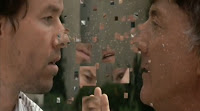sometimes, every once in a while, a movie based on a book does a pretty honest job. interview with a vampire, for example, kicked butt at this. granted, anne rice was intimately involved in the screenplay process, but no matter the reason, this was a rare win. the movie was not only AWESOME, but it was nearly identical to the book - in terms of character development, plot, even dialogue. then queen of the damned totally failed. awesome movie, but made no sense, and the book was a jillion times different. i suppose the question is, does it matter if the movie "isn't as good as the book?"

the immediate example that comes to mind is Sophie's Choice, by William Styron. (what?! i thought for sure she'd complain about lord of the rings! nope, it's been done to death.) i knew it would make me cry and i knew what the choice was, but that's pretty much all i knew when i read it. i also knew there was a movie that "people" were generally pretty stoked about, overall. so i flew through the book knowing the whole time that i would later be pointing out every variation in the movie, like in one of those games in Highlights magazine where you have to circle all the things that are different in the two pictures of the same scene.
little did i know that the book and the movie were two COMPLETELY different creatures. the way i've explained it before is that the book is over 500 pages long, and the movie covers about 100 pages, and does so quite selectively. it would be easier to try to figure out what's the same.
basically, this made me very angry. here's a book with sensitive subject matter, and tons of complexity and depth, and honestly, it's more about the narrator than stupid sophie, and i was so excited to see how a lot of it would translate, and the whole time i'm thinking 'this would be a really long movie,' and then BAM, it's a movie about the holocaust that doesnt make any sense. like we needed another one of those.
another example is everything is illuminated. that book was AWESOME. and nothing like i expected. and super fun to read. and the movie made absolutely NO sense. i dont know how these things happen. i guess that's why they make a point to say things like "based on the novel" or "based on a true story." then the creative license exists to do whatever you feel like to it!
ok, enough whining. i'm not even going to get into the books based on movies, fan fiction, and all that jazz (*cough* star wars books *cough*).
media is so much fun because of stuff like this. different media reach different audiences, and with each translation, a new version is created, and exists independently from the "original." i love reading a book and then watching the movie based on it, because it's a whole new experience (plus i like to make those comparisons and try to figure out if the screenplay writer, director, producer, etc. had a different interpretation of what was important to the story as a whole, blah blah blah).
and new things are happening with this. ok, not super new, but pretty cool nonetheless. we've had batman movies and superman movies for quite some time, but since warner brothers bought the rights to certain dc comics, we've been inundated with some pretty badass-hollywood-movie versions of comic books. movies meant for adults, with depth and sex and yes, violence, at a level that was only alluded to in the comics meant for kids.
AND THEN! introduce video games into the mix. Prince of Persia: a brand spakin new movie that looks like it will be pretty sweet, based on a video game that's been around for quite some time. in a video game, you certainly have plot and character development, but a movie is pretty much just one story. so it's almost more of a spinoff... kind of like comics.. SAFE GROUND! lemme 'splain.
with a novel, you have a solid story with a clear beginning and end, specific characters, meanings, points, nuances, and so forth. you can't really mess with much without being a ruiner. with comics, you have your main character(s) and some recurring villains, and a bunch of episodic plots where all that has to happen is the hero defeats a bad guy. video games are similar - you keep the back story, the hero, and within those parameters you could insert almost any plot you'd like. which makes movies based on comics and games "safe" from jerks like me.

























